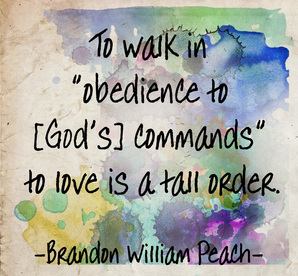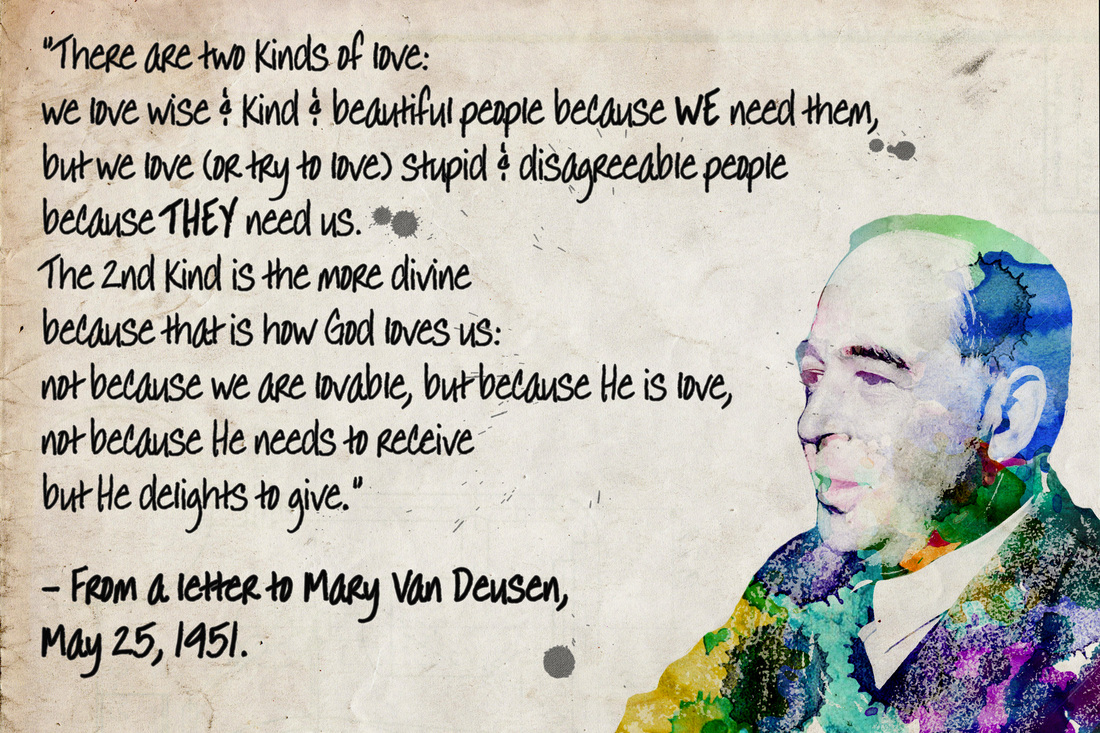|
4 The one who claims, “I know him,” while not keeping his commandments, is a liar, and the truth is not in this person. 5 But the love of God is truly perfected in whoever keeps his word. This is how we know we are in him. 6 The one who claims to remain in him ought to live in the same way as he lived. 2 John 1:4-6 CEB -Brandon William Peach- If you were asked where you fall on the spectrum articulated by Lewis above, a continuum that exists between “Wise, Kind, Beautiful” and “Stupid, Disagreeable,” where would you place yourself? I know where I’d place myself, and I suspect that most people feel the same. Even in a culture that espouses “first learn to love yourself” as some sort of affirmational prerequisite for loving others, my gut tells me that most of us end up on the opposite half of the spectrum. Stupid. Disagreeable. “Wise, Kind, Beautiful” and “Stupid, Disagreeable” are extremes - very few people would accept one of these definers as absolutely true all the time. But on this spectrum, this continuum, I would wager that more people find themselves in negative territory more often than in the positive. Because “love” can seem paradoxically so complex and yet so easily manipulated into a simple, sugarsweet notion, let’s turn to Scripture. The Second Epistle of John is believed by many Christians to have been written by John the Apostle, who was exiled to Patmos - referred to often in the Gospels as the “Disciple Whom Jesus Loved.” It’s appropriate, then, that he speaks to the recipient of his letter (“Dear Lady”) about love: “It has given me great joy to find some of your children walking in the truth, just as the Father commanded us. And now, dear lady, I am not writing you a new command but one we have had from the beginning. I ask that we love one another. And this is love: that we walk in obedience to his commands. As you have heard from the beginning, his command is that you walk in love.” 2 John 1:4-6  To walk in “obedience to [God’s] commands” to love is a tall order. Because, as Lewis explains in his above letter, God loves us not because we are particularly lovable, but because He delights in giving love to us. And in the very same way, He desires - commands - for us to love one another. This type of love is perhaps the defining characteristic of our God, expounded upon endlessly in Christ’s admonishments to love one another, our neighbor, our enemy, the same way that God loves us; that is, delighting to give love. The New Testament is rife with references to, proclamations of, this love. In John’s first epistle, referenced by Lewis in his letter to Van Deusen, he doesn’t say merely that God loves, or that God is like love, or that God gives love. He says “God is love.” The two are synonymous - without God, love cannot exist. Without love, God mustn’t. Scripture makes it clear that God loves us in spite of everything about us that’s frankly unlovable. And then He charges us to do the same. Back to the spectrum I mentioned - the continuum that exists between “Wise, Kind, Beautiful” and “Stupid, Disagreeable” - please take a moment to think again where you placed yourself and why. Do you believe that no matter where you fall on that spectrum, you’re still loved recklessly and wildly and amazingly and beautifully? Do you believe that God loves you when you feel He shouldn’t? The incredible theologian Fred Rogers (and no, I’m not being hyperbolic), said in a 2003 documentary,  “The greatest thing that we can do is to help somebody know that they're loved and capable of loving.” As a bit of background, I often feel unlovable. I feel like I’m a letdown to my wife and my two-year-old son. This is perhaps due to the fact that I’m a sufferer of major depressive disorder, and lies creep in a lot easier than truth. But to combat the lies, we have to accept the truth - no matter where we see ourselves on the spectrum, we must anchor ourselves in the fact that we are loved intensely by a God who looks past our imperfections. You are loved. I am loved. And not just by God, but critically by those who are enacting love in the very example of our God. According to biblical scholars, when John says he finds “some of your children walking in truth,” he’s not implying that the other children aren’t. Rather, he has been specifically acquainted with some in the Church who have committed to loving others in the radical and undiscriminating way that God loves. When we’ve accepted that we truly are loved, as Mr Rogers suggested, and that that love doesn’t go away when we feel stupid or disagreeable or undeserving or even desperate, we learn that we’re capable of loving. When we know that God loves us just as we are, we have the freedom to love others just as they are.  The cornerstone of the Gospel - that God so loved the (ugly, sinful, evil, hateful, ignorant, unlovable) world. He loved it so much that he literally condescended to live among it and die an unthinkable at its hand. To our God, it was worth it. When you accept that love and grab onto it and claim it as true, when you can proclaim within your heart that I AM LOVED, you’re doing so much more than “loving yourself.” You’re accepting the supreme Example of love. “God loves us,” Lewis concludes, “not because we are lovable but because He is love, not because He needs to receive but He delights to give." May we delight in giving love - the divine love that those undeserving need most. Brandon William Peach is a writer whose day job in a marketing firm pays the bills. His favorite thing in the world is spending time with his wife Kathleen and his two-year-old son William. Brandon's interests include literature, music, film, religion, and philosophy.You can friend or follow him at facebook.com/brandonwpeach, or read his infrequent tweets at twitter.com/brandonpeach. Wanna connect with others? Join Fig Tree on:
Our Subreddit Come to Facebook on Tuesday, at 8pm EST. Rev. Melissa will be livecasting an important message. |
Categories
All
Archives
October 2023
|




 RSS Feed
RSS Feed